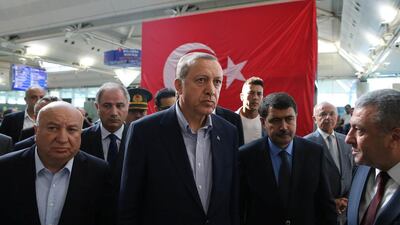A married couple in the eastern Anatolian province of Sivas made headlines in Turkey this year by naming their newborn triplets Recep, Tayyip and Erdogan. “We love our president and the names are beautiful,” the father, Erkan Bozkurt, told Turkish media.
Mr Bozkurt is not alone. According to polls, one out of two Turkish voters supports president Recep Tayyip Erdogan, despite the leader’s growing authoritarian tendencies and the thousands of lawsuits he has launched against Turkish journalists, students and activists accused of insulting him. After one and a half decades at the helm, the 62-year-old may have lost his image as a pro-EU reformer that once brought him praise from the West. But in Turkey itself, no politician comes close to him.
One reason for Mr Erdogan’s lasting appeal is the economy. Many Turks who still remember the days of hyperinflation and economic crashes cherish the stability and growing affluence under Mr Erdogan’s rule. Turkey’s GNP has almost tripled since his Justice and Development Party (AKP) took power in 2002. The number of cars on Turkish roads has more than doubled. Many people can afford an apartment to live in and a holiday for the first time in their lives. Although two-digit growth rates are a thing of the past, the economy is expanding enough to keep many people reasonably happy. Warning signs such as rising credit card debts have so far failed to make voters blame Mr Erdogan for their woes.
Another big factor is the president’s undisputed political talent. Even though he lives in a 1,100-room palace in Ankara, he still succeeds in presenting himself as the simple man from Kasimpasa, the lower middle-class neighbourhood in Istanbul where he grew up, lacing his speeches with colloquialisms and tough talk to fire up his supporters.
Mr Erdogan, a practising Muslim, can pull this off because he rose to fame as the leader of a social sea-change in Turkey. Under the AKP’s rule, the country’s traditional secularist elites were pushed out by a new class of more observant Turks. The Islamic headscarf is a symbol of that change: 20 years ago, the only women in headscarves in posh Istanbul malls were the ones cleaning the rest rooms; today they drive their Porsches right up to the valets and toss them the car keys as they swan in to shop at designer boutiques.
Making sure that the state and private media toe the government line is another boost for Mr Erdogan. He can get his message out much more efficiently than any rival. Over a span of 25 days before the June elections last year, public broadcaster TRT gave Mr Erdogan 29 hours of live coverage – four times the amount of hours devoted to all main opposition parties combined. The weakness of his rivals also helps. In western democracies, long-serving governments often suffer in the polls and at the ballot box because voters get tired of the same old faces and want a fresh start. In Turkey, the opposition offers no credible alternative to Mr Erdogan. On the left, the secularist Republican People’s Party (CHP) is struggling to find a way to break out of its 20-plus per cent mould of support as reformers battle with old-timers suspicious of political change. On the right, leaders of the Nationalist Movement Party (MHP) are in the middle of a power struggle. The pro-Kurdish Democratic Peoples’ Party (HDP) is squeezed by Mr Erdogan on one side and by the Stalinist Kurdistan Workers’ Party (PKK) on the other.
Given the chaos on the opposition benches, Mr Erdogan is free to play his strongest card. His authoritarian style and efforts to concentrate power in his own hands appeal to many Turks’ idea of a strong leader.
It is no coincidence that he is being compared to modern Turkey’s founder Mustafa Kemal Ataturk, who ruled the republic from its creation in 1923 until his death in 1938. Ataturk did not have to put up with any of the democratic checks and balances provided by opposition, parliament, the judiciary or civil society. In fact, Turkey didn’t even have an official opposition back then – it was a one-party state.
Mr Erdogan’s plan to turn Turkey from a parliamentary into a presidential republic taps into that mentality. One of his main arguments for the proposed system switch is that it would streamline decision-making and speed up things by eliminating frictions between different state bodies. That logic and top-down approach go down well with voters who have little time for squabbling politicians and bean-counting bureaucrats. It will be no surprise if Mr Erdogan wins the referendum on the presidential system that he is proposing. If the strong leader model will serve democracy is another question.
Thomas Seibert is a journalist who specialises in Middle East affairs

